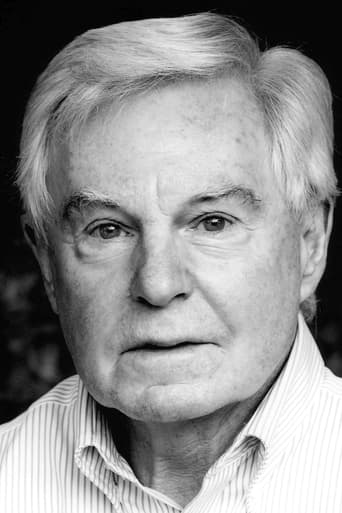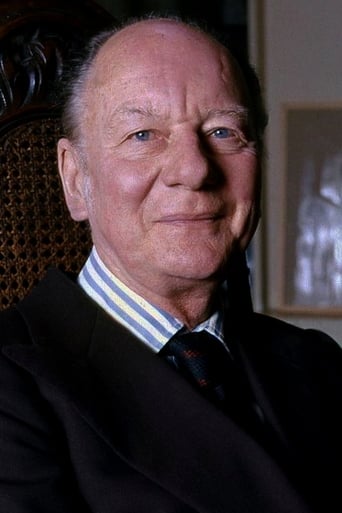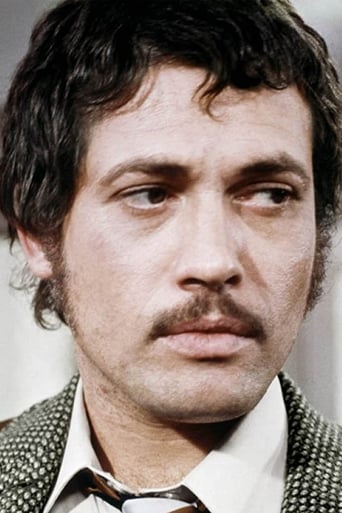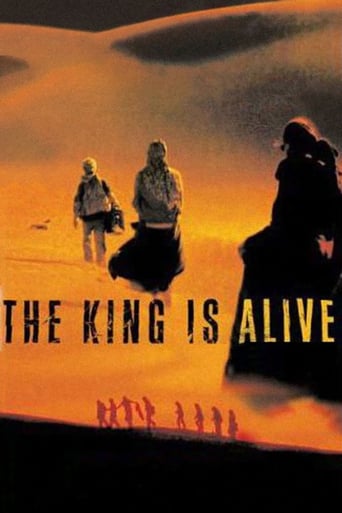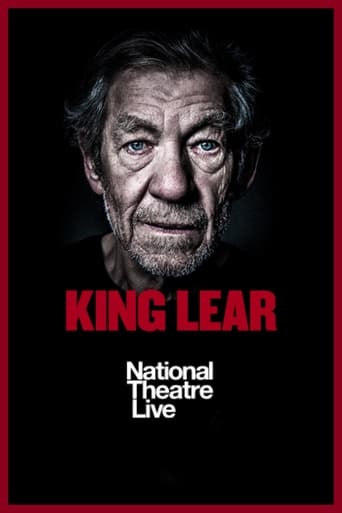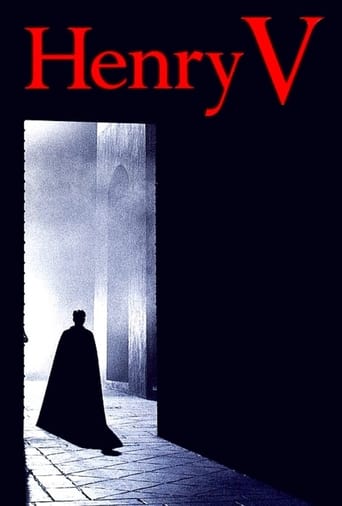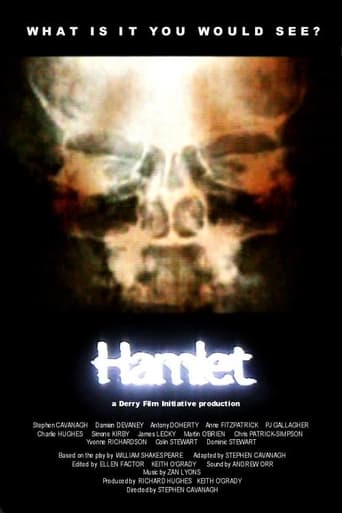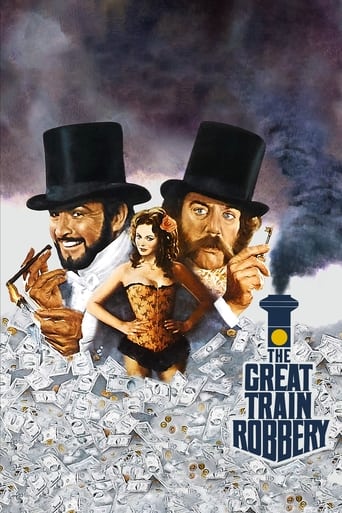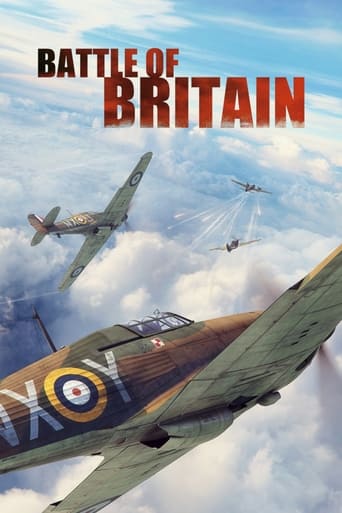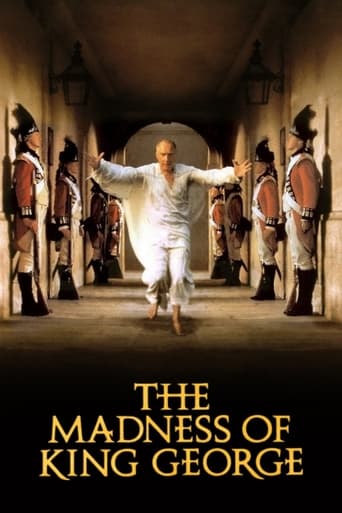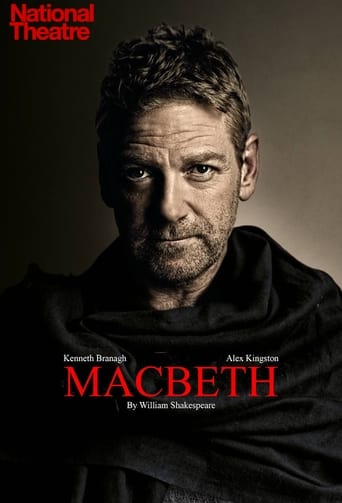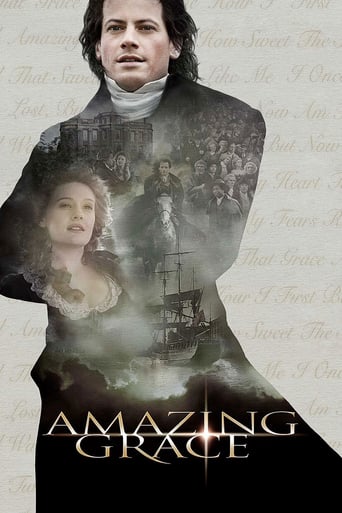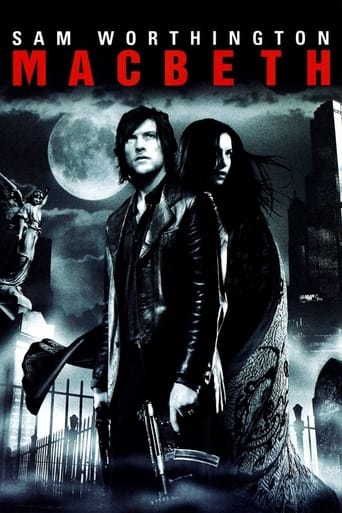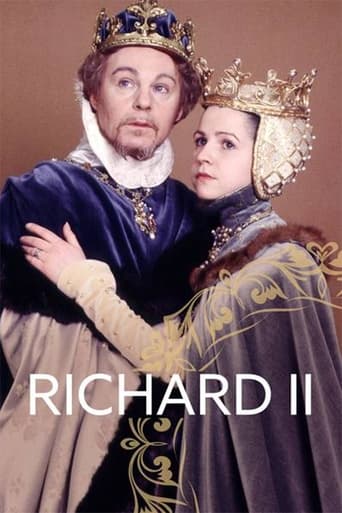

Richard II (1978)
Richard II, who ascended the throne as a child, is a regal and stately monarch. He believes he is the rightful ruler of England, ordained by God, yet he is a weak and ineffective king - wasteful in his spending habits, unwise in his choise of chansellors, and detached from his country and its people. When he seizes the land of his cousin Henry Bolingbroke, both the commoners and the barons decide that their king has gone too far...
Watch Trailer
Cast


Similar titles
Reviews
This is a great play with the full music of Shakespearean language, including the music, loud indeed, of historical semantics. But let me BE more to the point.We have here the story of King Richard II, the son of the Black Prince, born in Bordeaux. In the play he starts with grandeur and grandiose pompousness and that is emphasized by costumes that are heavy and huge. Confronted with Bolingbroke's accusations against Thomas Mowbray, duke of Norfolk, and vice versa in some reciprocal verbal vendetta. They agree on an ordeal, in fact a fight to the death like some feudal tournament, the winner is innocent, the other is dead. The king then appears reasonable, and yet he stops the fight just before it starts and banishes the two young men. Mowbray for life and his cousin Bolingbroke for ten years, reduced to six on the appeal from John of Gaunt, Duke of Lancaster, and the father of Bolingbroke. Strangely enough the King has two uncles, Edmund of Langley, duke of York, and John of Gaunt, duke of Lancaster, but no father of course since he died on 1376. Then the king decides to go to Ireland for some expedition, military tourism of the time. On his way he visits John of Gaunt who is dying and dies in front of him and the king reveals his real nature. We know he is slightly tyrannical, definitely nepotistic and extremely vain in his anti-feudal stance against a fight to deliver justice. But after the death of his uncle John of Gaunt he announces that he will seize the whole assets of the man, castle, money, land, along with the chattel (including the serfs of course). He thus dispossesses his cousin who is not present since he has been banished. The king appears there as someone who should retire from power, but in feudal times that was not the normal procedure, and in fact no one could or should even hint at questioning the authority of the King: that was treason and nothing else, a treason totally enforced by the authority of the church, and that is one stake of this play. The king leaves his other uncle Edmund of Langley, Duke of York, as the regent during his absence. We can see the rivalry between the two houses of York and Lancaster, the famous two roses, getting in place and Richard II is vastly responsible for what was going to happen.Back from Ireland he finds himself in front of a rebellion led by Bolingbroke, the duke of Lancaster, who has come back from exile with no permission and who, though dispossessed, has managed to get the nobles on his side and the king has to resign, or abdicate. Shakespeare insists on this abdication and the subsequent coronation, imprisonment and final assassination. It is important to know that such a procedure is not possible: that's why the church is reluctant and the play insists on the fact that he is not dismissed, but he voluntarily abdicates in favor of his cousin Henry. But in the mean time the son of the Duke of York, the duke of Aumerle has been convicted of treason and condemned to death. He is part of some plot involving the church. His mother and father go plead with the king, the new king, Henry IV who yields on this Duke of Aumerle but on none of the other plotters. At this moment we can see the war of the Roses behind, looming up slowly since the King is now a Lancaster and the plotters are around as well as inside the house of York. The pardon to the son will leave the house of York with a direct heir and that pardon was probably a mistake from the Lancaster the king is, but history is full of mistakes.This play has very lyrical moments that are creative reflections on power, the isolation of power, the sadness of power and yet the responsibility of power. Richard II thinks he is power by essence and thus his abdication should physically destroy him, which is not the case. At the same time the rivalry between the two houses is coming up slowly but it is inflamed by the zeal of some courtiers. In this case the assassination of Richard is a direct provocation against the house of York, and at the same time the pardon to the Duke of Aumerle is an act of weakness that does not improve anything. In spite of the dramatic events, and the tragic though slightly melodramatic end, of this play the historical reflection it contains is probably not that clear, not that fully constructed. I mean it is contradictory. The characters are not always conscious they have to accept power and do what the situation requires. Richard II becomes dictatorial with age, which is abuse of power, though he is rather young when he falls, and Henry IV is rather hesitant and lacks determination at the end of the play, at the beginning of his reign, and Shakespeare shows how the clergy and some nobles are plotting in the wings, behind the back of the king. In feudal times a king could only grant his own abdication and he would do this only if ge felt there was a full alliance of the nobles and the church against him: that's at least what happened with Magna Carta.That's Shakespeare's conception of politics: it is always fishing in dark water, maneuvering with no visibility, speculating with no specular mirror or magnifying glass, hence seeing nothing, neither any reflection nor any enlarged picture. This history though does not have any comical scene or character, apart from the scene in some bathing and massaging hall or cellar, the king is having some fun with his "creatures Bushy, Bagot and Green. [...]Dr Jacques COULARDEAU
I have loved Shakespeare since reading Twelfth Night in my sixth year at primary school. And I admire most of the actors here, most notably Derek Jacobi and John Gielgud. This performance of Richard II is just wonderful. The production values are very good if not as good as the dialogue and performances. The sets do convince you of the time and place at least, and the costumes do have a sense of regality to them. Shakespeare's dialogue is brilliant, both poetic and forceful.And the story of loyalty and betrayal as well as rebellion and politics is always compelling and delivered and staged with utter conviction. All the performances are superb, delivering their lines gracefully and intelligently with a good deal of intensity when needed. In particular Derek Jacobi, his performance is a masterclass in abject humiliation that later replaces Richard's kingly pride complete with a regal demeanour and a sense of human thought. Jon Finch is a handsome yet appropriately dark and brooding Bolingbroke and Charles Gray and Wendy Hiller give equally adept performances, but it was John Gielgud that gave the best supporting performance, his This is England...speech is chillingly moving in how elegiac the dialogue and delivery was.Overall, the brilliant performances especially were what made this Richard II so great. 10/10 Bethany Cox
BBC Shakespeare's history cycle ran right the way from this play, 'Richard II', through to 'Richard III', by way of Henries IV, V, and VI.A neglected play, entirely in verse, and often thought superficial and unlikely to stand up to study (rarely taught in schools, for example), 'Richard II' is nevertheless one of Shakespeare's most engrossing and beautiful plays. It has passages of text that have gone down into theatre legend, not least John O'Gaunt's 'Methinks I am a prophet new inspired'.In casting this production surpassed itself. Derek Jacobi brings Richard a soul and a spirit, whether he is playing him as vain and selfish in the early scenes, or broken and discouraged post-deposition. It is a tricky role which he performs extremely well. Opposing him as the future Henry IV is Jon Finch, who also left us a memorable film Macbeth a few years earlier, an actor of considerable range who seems to have worked little in recent years. Here he is a perfect foil to the spoilt Richard.In support, John Gielgud gives a mighty performance as Gaunt, while the likes of Charles Gray, Wendy Hiller, and Mary Morris, bring life to other, more minor roles. The sets are not expensive or, backdrops at least, that convincing, but the play and text is strong enough for that not to matter.A highly recommended version of a play rarely filmed or performed, and a good scene setter for the rest of the History Plays.
I saw this on TV when it was originally broadcast back in 1978. All of these years I've remembered Derek Jacobi's performance. I just saw the DVD version, and he is just as brilliant as I remembered. There are nuances to the performance that I didn't notice when I first saw it at a lot younger age. Several of the BBC productions of Shakespeare plays were excellent; this is one of the very best.I also enjoyed Charles Gray and Wendy Hiller as the Duke and Duchess of York. They are almost comic characters in some ways, yet not quite. Both actors do very well in their roles.Shakespeare plays are so timeless that this doesn't seem dated at all. I'm very glad that I saw King Richard II again.


